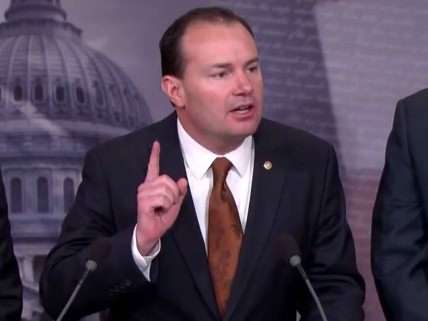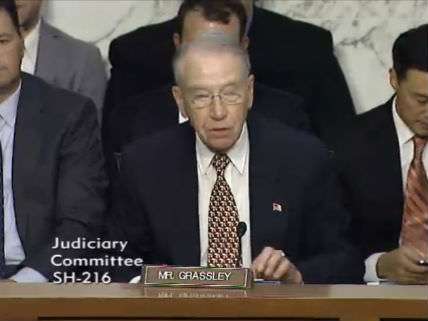Chuck Grassley Says Sentencing Reforms Backed by Mike Lee and Ted Cruz Are 'Lenient' and 'Dangerous'
Opposition by the hard-line drug warrior counts as an endorsement.

Today Sens. Mike Lee (R-Utah) and Richard Durbin (D-Ill.) reintroduced the Smarter Sentencing Act, a major reform bill that passed the Senate Judiciary Committee last year but never got a floor vote. This year's version of the bill, like last year's, would make the shorter crack sentences Congress approved in 2010 retroactive, cut mandatory minimums for various drug offenses in half, and expand the "safety valve" for low-level, nonviolent offenders. A newly added provision would eliminate the mandatory life sentence for a third drug offense, replacing it with a 25-year term.
"Reintroduction of the Smarter Sentencing Act confirms that Congress is more committed than ever to reforming our federal sentencing laws and addressing the crisis in the Bureau of Prisons," says Julie Stewart, president of Families Against Mandatory Minimums. "While we expected this bill to be reintroduced, we are thrilled to see it has even more co-sponsors and that it addresses the appalling life-without-parole statute for drug offenses."
The bill's co-sponsors include Sens. Patrick Leahy (D-Vt.), Cory Booker (D-N.J.), Chris Coons (D-Del.), Jeff Flake (R-Ariz.), Ted Cruz (R-Texas), and Rand Paul (R-Ky.). Reps. Raul Labrador (R-Idaho) and Bobby Scott (D-Va.) are sponsoring the House version.
Although the Smarter Sentencing Act would mean less time behind bars for thousands of drug offenders, it is not as ambitious as the Justice Safety Valve Act, which Paul and Leahy reintroduced last week. That bill would effectively make mandatory minimums optional by allowing judges to depart from them in the interest of justice.

Despite bipartisan backing for both bills, the prospects for serious sentencing reform are decidedly darker now that Charles Grassley (R-Iowa), a hard-line drug warrior, has replaced Leahy as chairman of the Senate Judiciary Committee. In a floor speech today, Grassley called the Smarter Sentencing Act—which among other things would reduce the 20-year, 10-year, and five-year mandatory minimums for drug offenses to 10 years, five years, and two years, respectively—"lenient" and "dangerous." How so? Grassley emphasizes that cases in which drug offenders receive mandatory minimums generally involve substantial amounts of drugs and manufacture, smuggling, or distribution. To his mind, that shows it's simply not true that "federal mandatory minimum sentences are putting large numbers of nonviolent offenders in jail for long periods of time at great taxpayer expense."
Grassley seems to be equating the requirements for receiving a mandatory minimum with violence, which is more than a little puzzling. If you are convicted of growing 100 or more marijuana plants, for example, you are subject to a five-year mandatory minimum sentence under federal law. And if you happen to own a gun, five years become 10, which is the penalty that awaits the Kettle Falls Five, medical marijuana patients in Washington who are scheduled to be tried in federal court later this month. If you are convicted of possession with intent to distribute 28 or more grams of crack, that will get you five years the first time around and 10 years if you have a prior conviction. If you plead guilty to mailing more than 10 grams of LSD (counting the weight of the blotter paper) and you have two minor LSD-related priors, you will be sent to federal prison for life, which is what happened to a harmless Deadhead named Tim Tyler.
Contrary to what Grassley seems to think (or wants you to think), no violence is necessary to trigger these or any of the other mandatory minimums that would be shortened by the Smarter Sentencing Act. But in the senator's view, addressing such grotesque injustices would make Congress "lenient." In case his fellow legislators realize that exceeding an arbitrary weight threshold does not automatically make a drug offender violent, Grassley warns that the Smarter Sentencing Act "would cut in half the mandatory minimum sentences for members of the Taliban, al-Qaeda, ISIS, or Hezbollah who deal drugs to fund acts of terror." There you have it: If acid-sharing Deadheads do not go to prison for the rest of their lives, the terrorists win.
Further evidence that Grassley's idea of proportionality may not comport with a sane person's: He says he is open to "lowering some federal mandatory minimum sentences" as long as he can "add or raise new ones." Among the crimes that Grassley thinks are treated too leniently under federal law: possession of child pornography.


Show Comments (59)